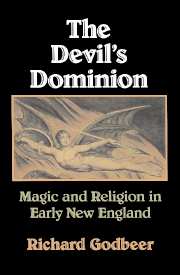Book contents
- Frontmatter
- Contents
- Acknowledgments
- Prologue
- Introduction
- 1 Magical Experiments: Divining, Healing, and Destroying in Seventeenth-Century New England
- 2 The Serpent that Lies in the Grass Unseen: Clerical and Lay Opposition to Magic
- 3 Entertaining Satan: Sin, Suffering, and Countermagic
- 4 Sinful Curiosity: Astrological Discourse in Early New England
- 5 Insufficient Grounds of Conviction: Witchcraft, the Courts, and Countermagic
- 6 Rape of a Whole Colony: The 1692 Witch Hunt
- Epilogue
- Appendix A Witchcraft Trials in Seventeenth-Century New England (Excluding Persons Accused During the Salem Witch Hunt)
- Appendix B Persons Accused During the Salem Witch Hunt
- Name Index
- Subject Index
5 - Insufficient Grounds of Conviction: Witchcraft, the Courts, and Countermagic
Published online by Cambridge University Press: 05 October 2010
- Frontmatter
- Contents
- Acknowledgments
- Prologue
- Introduction
- 1 Magical Experiments: Divining, Healing, and Destroying in Seventeenth-Century New England
- 2 The Serpent that Lies in the Grass Unseen: Clerical and Lay Opposition to Magic
- 3 Entertaining Satan: Sin, Suffering, and Countermagic
- 4 Sinful Curiosity: Astrological Discourse in Early New England
- 5 Insufficient Grounds of Conviction: Witchcraft, the Courts, and Countermagic
- 6 Rape of a Whole Colony: The 1692 Witch Hunt
- Epilogue
- Appendix A Witchcraft Trials in Seventeenth-Century New England (Excluding Persons Accused During the Salem Witch Hunt)
- Appendix B Persons Accused During the Salem Witch Hunt
- Name Index
- Subject Index
Summary
If any man or woman be a Witch, that is, hath or consulteth with a familiar spirit, they shall be put to death. Exod.22.18. Lev.20.27. Deut.18.10,11.
General Lawes and Libertyes Concerning the Inhabitants of the MassachusettsIn 1661, William Holmes of Marshfield, Plymouth Colony, brought a legal complaint against his neighbor Dina Silvester for declaring in public that Holmes's wife was a witch. Summoned to court, Silvester swore that Goodwife Holmes had recently appeared to her, “about a stones throw from the higheway,” in the shape of a bear. In Silvester's opinion, this ability to assume animal form was a sure sign that Goodwife Holmes was indeed a witch. But the magistrates wanted proof of the Devil's involvement in Holmes's transformation; as far as they were concerned, witchcraft was an inherently diabolical phenomenon. The magistrates asked Silvester “what manor of tayle the beare had,” presumably hoping for a forked tail. Silvester answered that “shee could not tell, for his head was towards her.” The court, frustrated by Silvester's failure to provide any indication of a demonic presence, refused to take her story seriously and found her guilty of defamation. Silvester was required to sign a statement “freely acknowlidg[ing]” that she had “wronged” her neighbor.
- Type
- Chapter
- Information
- The Devil's DominionMagic and Religion in Early New England, pp. 153 - 178Publisher: Cambridge University PressPrint publication year: 1992



